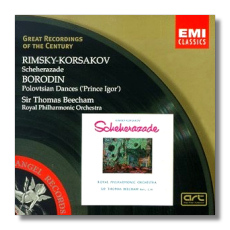
The Internet's Premier Classical Music Source
Related Links
- Latest Reviews
- More Reviews
-
By Composer
-
Collections
DVD & Blu-ray
Books
Concert Reviews
Articles/Interviews
Software
Audio
Search Amazon
Recommended Links
Site News
 CD Review
CD Review
Nicolai Rimsky-Korsakoff

Schéhérazade
- Nicolai Rimsky-Korsakoff: Schéhérazade, Op. 35 (1888)
- Alexander Borodin: Polovtsian Dances (From Prince Igor)
Steven Staryk, violin
Royal Philharmonic Orchestra/Thomas Beecham
EMI 66998
Okay, I'll write the last line first. This is one of the finest Schers ever, in refurbished sound that is much better than the original CD issue and as good as the LP.
Now, back to the first line. Scher is one of the warhorses. While writing this I began to wonder what made for a warhorse. There are over 44 listings for this piece in the Summer 1999 Opus. Every conductor imaginable has recorded it. In the case of Stokowski there are 6 commercial recordings and a couple live ones around. I read about the piece and was told that it really became popular when it was the music used for a ballet written in 1910 using this music. Stokowski first conducted it that year in Cincinnati. Why is it that pieces like this win audience approval so strong that it becomes a "warhorse"?
Well, if you listen to Beecham's recording the answer comes to you. Schéhérazade is chock full of memorable, catchy melodies, tunes, that it inculcates itself into people's heads. Beecham, more than Stokowski, captures the ballet essence of the music. You can put this disc on some evening, sit back and just enjoy the whole thing. The Sultan opens the discourse with duly threatening clouds, Scher, Staryk, is sweet toned and seductive. The remastered sound adds to the pleasure. The music is warm, just the right amount of reverb is in the sound, there is air around the music and the bass has a tactile sensation to it.
Now, I have to admit that Stokowski is my favorite conductor of Scher. His 1934 recording is a wallow (Cala 521). The portmanteau makes the whole thing sway to and fro enough to make many seasick. It is perverse, but I don't care. Stokowski treats the piece more like a concerto for orchestra than does Beecham. Now, the piece easily fits to either interpretation and we are talking here a matter of degree rather than kind. Still, there are so many lovely solo details when Stokowski conducts the work. The best "concerto" recording Stokowski made was with the Philharmonia, now on Testament 1139. In that recording Stokowski also had the finest Scher of the six he went into the studio with, Manoug Parikian (what nationality is that?). The recording lists the soloists in all the sections, not just the leader, and rightly so. Still, the best Schéhérazade of all is the 1964 recording Stokowski made with the London Symphony for the Phase-4 series. Frankly, the recording verges on X-rated it is so sensuous. That CD issue, however, is no longer available and if you have it you need to crank the treble way back to make it tolerable on the ear.
Moving right along, if you must have a digital version, the EMI issue with Mariss Jansons and the London Philharmonic captures a perfect middle ground between the ballet aspect and the concerto one. The recording is warm and details delicious. It is also coupled with an excellent Capricio Espagñole, (EMI 55227).
Back to this issue. To continue to praise the Beecham Scher would be redundant. My only reservation about this disc is the coupling. I cannot abide the Polovtsian Dances. I find them mundane. Here is a case where memorable tunes become a pain in memory's ear. If I find myself humming it I start slapping myself on the head muttering, "Get out! Get out!" Seriously, you may not have the aversion to the Borodin that I do and it is a popular piece. Any lover of Scher should own this disc.
Copyright © 1999, Robert Stumpf II


















